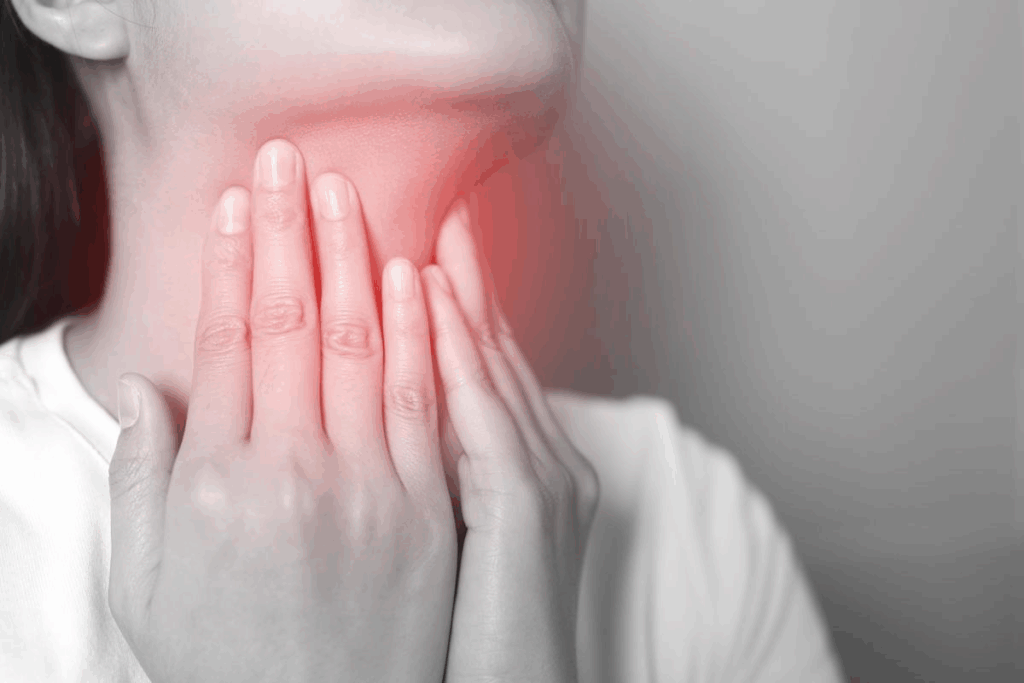Last Updated on October 31, 2025 by Saadet Demir

A burning sensation in your throat can be really uncomfortable and affect your daily life. Knowing what causes it is the first step to feeling better. At Liv Hospital, we focus on you with our team approach and proven methods to find the source of your pain. Why does my throat burns when I swallow? Learn about common causes, including infection, strep throat, and acid reflux.
Gastroesophageal reflux disease (GERD) is a big reason for a burning sensation in the throat. It’s estimated that about half of all people deal with acid reflux at some time. We’ll look at why your throat might burn when swallowing, including GERD, infections, and other reasons.

When your throat feels like it’s burning, it’s normal to wonder what’s causing it. This discomfort can make it hard to swallow and talk. It’s important to find out why and how to feel better.
There are many reasons for a burning throat. Infections, allergies, and acid reflux are common causes. The common cold and strep throat can cause inflammation and irritation. Allergies can also irritate the throat with postnasal drip.
Acid reflux, or GERD, is another big cause. When stomach acid goes back up into the esophagus, it can irritate the throat. Knowing the cause helps find the right treatment.
It can be hard to tell if you have a burning throat or other discomfort. But, some signs can help figure it out. For example, if you have trouble swallowing or a sore throat, it might be an infection or inflammation.
To understand the different causes and symptoms, let’s look at a table:
Cause | Symptoms | Additional Characteristics |
Infections (Cold, Strep Throat) | Burning sensation, sore throat, difficulty swallowing | Fever, swollen lymph nodes, cough |
Allergies | Burning sensation, postnasal drip, itchy throat | Sneezing, runny nose, itchy eyes |
Acid Reflux (GERD) | Burning sensation, heartburn, regurgitation | Symptoms worsen after eating, lying down, or bending over |
Knowing the symptoms and signs of each cause helps you find the right relief. This way, you can tackle your throat burning and feel better.

GERD is a common condition where stomach contents flow back into the esophagus. This can cause a burning sensation in the throat. It happens when the lower esophageal sphincter (LES) doesn’t close right, letting stomach acid into the esophagus.
When stomach acid flows back into the esophagus, it irritates and inflames the area. This leads to a burning feeling in the throat. Swallowing can make this feeling worse, as it pushes the acid up towards the throat.
GERD brings more than just throat burning. Some symptoms include:
Several things can make you more likely to get GERD. These include:
Risk Factor | Description |
Obesity | Being overweight can put pressure on the stomach, causing acid to back up into the esophagus. |
Pregnancy | Hormonal changes during pregnancy can relax the LES, increasing the risk of GERD. |
Smoking | Smoking can weaken the LES and reduce saliva production, which helps neutralize acid. |
Certain Foods | Eating spicy, fatty, or acidic foods can trigger GERD symptoms in some people. |
Knowing these risk factors and symptoms can help manage and treat GERD. This can reduce throat burning and other discomforts.
Throat burning is often linked to acid reflux and heartburn. These issues affect millions globally. Stomach acid flowing back into the esophagus can irritate the lining, causing discomfort.
Acid reflux happens when the lower esophageal sphincter (LES) doesn’t work right. This lets stomach acid flow back into the esophagus. This backflow can irritate the esophagus and throat, causing a burning feeling. The burning sensation can be more severe based on how often and how much acid reflux occurs.
Occasional acid reflux is common and usually not a big deal. But, Gastroesophageal Reflux Disease (GERD) is a chronic condition. GERD is diagnosed when acid reflux happens often, more than twice a week, or is very severe. The main difference is how often and how much it affects daily life.
Characteristics | Occasional Acid Reflux | GERD |
Frequency | Less than twice a week | More than twice a week |
Symptom Severity | Mild | Moderate to Severe |
Impact on Daily Life | Minimal | Significant |
For quick relief from acid reflux and throat burning, several strategies can help. These include:
By understanding the causes and using these relief strategies, people can manage their symptoms well. This can greatly improve their quality of life.
Viral infections can make your throat feel like it’s on fire. These infections are common and affect many people around the world. We’ll look at how the common cold, influenza, and COVID-19 can make your throat burn.
The common cold and flu are top causes of a burning throat. They spread easily through coughs, touching surfaces, and being near sick people.
Symptoms include:
To ease throat burning, rest, drink lots of water, and use over-the-counter meds are key.
COVID-19 can also make your throat burn. Its symptoms vary from mild to severe and include throat irritation.
To handle COVID-19 throat pain, follow health guidelines, stay hydrated, and use pain relievers.
Dealing with viral throat pain needs self-care and sometimes meds. Here are ways to ease throat burning:
Knowing why your throat burns from viral infections and using these tips can help lessen the pain.
Bacterial infections like strep throat are key causes of throat burning. They can cause severe discomfort, needing quick medical attention and treatment.
Strep throat is caused by Streptococcus pyogenes. It has clear symptoms:
To spot strep throat, doctors use physical checks and tests like rapid strep tests or throat cultures. Quick diagnosis is key for good treatment.
Other bacterial infections also lead to throat burning. These include:
Infection | Causative Agent | Symptoms |
Diphtheria | Corynebacterium diphtheriae | Throat membrane, difficulty breathing |
Arcanobacterium haemolyticum | Arcanobacterium haemolyticum | Sore throat, rash |
Gonococcal pharyngitis | Neisseria gonorrhoeae | Throat pain, sometimes no symptoms |
Antibiotics are the main treatment for bacterial infections causing throat burning. The right antibiotic depends on the infection and the patient. It’s vital to finish all antibiotics to avoid resistance and ensure healing.
For strep throat, doctors often prescribe penicillin or amoxicillin. If a patient can’t take penicillin, they might get azithromycin or clarithromycin instead.
Eating certain foods can cause a burning sensation in the throat. This happens more with some foods than others. The type of food eaten plays a big role.
Spicy and acidic foods often make the throat burn. Spicy foods have capsaicin, which irritates the mucous membranes. Acidic foods, like citrus or tomatoes, also cause irritation because of their low pH.
To understand how different levels of spiciness or acidity affect the throat, let’s examine the following table:
Food Type | Effect on Throat |
Spicy Foods | Irritation due to capsaicin |
Acidic Foods | Irritation due to low pH |
Neutral Foods | Minimal to no irritation |
Food allergies and sensitivities can also cause throat burning. When someone eats something they’re allergic or sensitive to, their body may react. This can lead to inflammation or irritation in the throat.
Common symptoms of food allergies or sensitivities include:
Hot beverages, like coffee or tea, can irritate the throat. This is more likely if they’re very hot. The heat can cause discomfort or a burning sensation.
To avoid throat burning after eating, it’s best to limit foods and drinks that irritate. If the problem doesn’t go away, seeing a healthcare professional is a good idea.
Mucus from the sinuses draining into the throat can cause irritation and discomfort. This is known as postnasal drip, a common reason for throat burning. Knowing how sinus health affects the throat can help manage symptoms better.
Postnasal drip happens when too much mucus from the nose drips down the throat. This can make the throat lining feel irritated, causing a burning feeling. Dry air, allergies, or infections can make this worse by producing more mucus.
Managing Postnasal Drip: Drinking plenty of water, using humidifiers, and avoiding things that irritate the throat can help.
Allergies and sinus infections often cause postnasal drip. Allergies make more mucus, while infections cause inflammation and mucus buildup. It’s important to find and treat the cause to feel better.
Common allergens include dust, pollen, and pet dander. Sinus infections might need antibiotics if they’re bacterial.
Controlling mucus production and drainage can lessen throat irritation. This can involve changing your lifestyle, using over-the-counter meds, or sometimes prescription treatments.
Method | Description | Benefits |
Staying Hydrated | Drinking plenty of fluids to thin out mucus | Eases drainage, reduces throat irritation |
Humidifiers | Using devices to add moisture to the air | Soothes the throat, reduces mucus viscosity |
Saline Nasal Sprays | Using saline solutions to moisturize nasal passages | Reduces nasal congestion, promotes drainage |
Understanding postnasal drip and how to manage it can help with throat burning. Making lifestyle changes or using medical treatments can help. Finding and treating the cause is the best way to feel better.
It’s important to know about esophagitis and other inflammatory conditions to understand throat burning. Esophagitis is when the esophagus gets inflamed. This can happen due to GERD, infections, or some medicines. It can really hurt and make swallowing hard.
There are different kinds of esophagitis, each with its own causes and symptoms. Here are the most common ones:
The symptoms of esophagitis can vary. But common ones include:
If not treated, esophagitis can cause serious problems. These include a narrowed esophagus or ongoing inflammation. It’s key to catch it early and treat it to avoid these issues.
How to treat esophagitis and other inflammatory conditions depends on the cause. Here are some common ways to treat it:
By knowing the causes and using the right treatments, people can ease the discomfort of esophagitis and other inflammatory conditions.
There are many ways to treat a burning throat, depending on the cause. You can try over-the-counter medicines or make lifestyle changes.
For quick relief, try over-the-counter (OTC) medicines. Antacids like Tums or Rolaids can neutralize stomach acid. Pain relievers such as Tylenol or Advil can also help by reducing pain and swelling.
Lozenges and throat sprays are other OTC options. They often have ingredients like menthol or eucalyptus. These can numb your throat and give temporary relief.
Medication Type | Examples | Purpose |
Antacids | Tums, Rolaids | Neutralize stomach acid |
Pain Relievers | Tylenol, Advil | Reduce pain and inflammation |
Lozenges/Throat Sprays | Menthol, Eucalyptus products | Numb the throat area |
If OTC medicines don’t work, you might need prescription drugs. For bacterial infections like strep throat, antibiotics are used. For GERD, proton pump inhibitors (PPIs) or H2 blockers can help.
“The right medication can significantly alleviate the discomfort of a burning throat, but it’s important to see a doctor for the right diagnosis.”
Medical Expert, ENT Specialist
There are many home remedies for a burning throat. Gargling with warm salt water can reduce swelling and kill bacteria. Drinking plenty of fluids, like tea or broth, can also soothe your throat. Honey can be eaten on its own or mixed with warm water or tea to soothe your throat.
Changing your lifestyle can help prevent throat burning. Avoid foods that trigger acid reflux or allergies. Eating smaller meals can also help. Plus, raising your bed by 6-8 inches can prevent acid reflux during sleep.
By trying these treatments, you can find relief from a burning throat and live better.
If you have a burning throat, it’s important to know when to see a doctor. Throat burning can mean different things, some of which need quick medical help.
Some symptoms with throat burning mean you should see a doctor. These include:
Seeing a doctor right away is key if you have these symptoms. The American Academy of Otolaryngology says, “Early treatment can greatly help throat problems.”
“If you have trouble breathing or swallowing, go see a doctor right away.”
The doctor will check you thoroughly. They’ll look at your medical history and examine your throat. They might ask about your symptoms, like when they started and how long they last.
They might also do tests to find out why your throat is burning.
Tests might include:
Test | Purpose |
Throat culture | To find bacterial infections like strep throat |
Endoscopy | To see the esophagus and throat for any issues |
Allergy testing | To see if allergies are causing your throat problems |
Knowing why your throat is burning is key to getting better. By going to the doctor when needed, you can find out what’s wrong and feel better.
Understanding why your throat burns is key to feeling better. We’ve looked at many reasons, like GERD, infections, what you eat, and inflammation.
Knowing the cause helps you find the right treatment. You can try medicines, home remedies, or change your lifestyle. These options can help ease throat pain.
In short, throat burning can come from many sources. Finding and treating the cause can help you feel better. If your throat pain doesn’t go away, see a doctor for help.
A burning throat can be due to many reasons. Acid reflux, infections, allergies, and spicy foods are common causes. Knowing the cause helps find the right solution.
Acid reflux happens when stomach acid goes back up into the esophagus. This irritates the throat, causing a burning feeling. It’s often a sign of Gastroesophageal Reflux Disease (GERD), which needs medical help.
GERD is a long-term condition with frequent acid reflux. Occasional acid reflux happens less often. If you have constant heartburn and throat burning, you might have GERD.
Strep throat is a bacterial infection. It causes severe throat pain, fever, and swollen lymph nodes. If you have these symptoms, see a doctor for diagnosis and treatment.
Yes, spicy, acidic, or hot foods can irritate the throat. Food allergies and sensitivities also cause burning.
Managing mucus helps with throat burning from postnasal drip. Use nasal decongestants, saline sprays, and drink plenty of water.
Treatments for esophagitis and other conditions include medications and lifestyle changes. These help reduce inflammation and symptoms.
If throat burning is constant, or if you have trouble swallowing, see a doctor. They can evaluate and treat your symptoms.
A doctor will check your symptoms and perform a physical exam. They might also do tests to find the cause of your throat burning.
To ease acid reflux throat burning, avoid trigger foods and elevate your bed. Antacids or acid reducers can also help. If symptoms don’t improve, see a doctor.
Home remedies include staying hydrated and gargling with salt water. Avoid spicy foods and manage stress to help your throat.
Yes, avoiding trigger foods, staying healthy, and managing stress can help with long-term throat burning relief.
Subscribe to our e-newsletter to stay informed about the latest innovations in the world of health and exclusive offers!
WhatsApp us